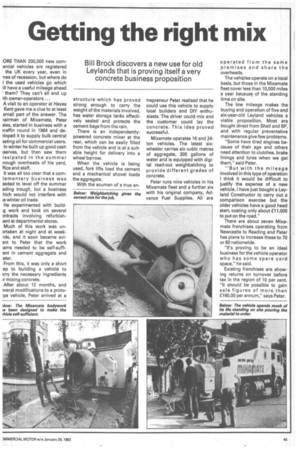Getting the right mix
Page 47

If you've noticed an error in this article please click here to report it so we can fix it.
Bill Brock discovers a new use for old Leylands that is proving itself a very concrete business proposition
IORE THAN 200,000 new cornlercial vehicles are registered the UK every year, even in res of recession, but where do I the used vehicles go which ill have a useful mileage ahead them? They can't all end up ith owner-operators ...
A visit to an operator at Hayes Kent gave me a clue to at least small part of the answer. The lairman of Mixamate, Peter )tes, started in business with a Iraffin round in 1964 and deloped it it to supply bulk central sating oil for commercial users. In winter he built up good cash serves, but then saw them issipated in the summer 'rough overheads of his yard, lice and staff.
It was all too clear that a cornlementary business was ?eded to level off the summer ading trough, but a business hich would not interfere with le winter oil trade.
He experimented with build:g work and took on several mtracts involving refurbishlent at departmental stores. Much of this work was un?rtaken at night and at week-ids, and it soon became evimt to Peter that the work .ams needed to be self-suffient in cement aggregate and ater.
From this, it was only a short ep to building a vehicle to irry the necessary ingredients ir mixing concrete.
After about 12 months, and :veral modifications to a proto;le vehicle, Peter arrived at a structure which has proved strong enough to carry the weight of the materials involved, has water storage tanks effectively sealed and protects the cement bags from the rain.
There is an independentlypowered concrete mixer at the rear, which can be easily filled from the vehicle and is at a suitable height for delivery into a wheel barrow.
When the vehicle is being used, fork lifts load the cement and a mechanical shovel loads the aggregate.
With the acumen of a true en trepreneur Peter realised that he could use this vehicle to supply local builders and DIY enthusiasts. The driver could mix and the customer could lay the concrete. This idea proved successful.
Mixamate operates 16 and 24ton vehicles. The latest sixwheeler carries six cubic metres of aggregate, 300 gallons of water and is equipped with digital read-out weighbatching to provide different grades of concrete.
Peter runs nine vehicles in his Mixamate fleet and a further six with his original company, Advance Fuel Supplies. All are operated from the same premises and share the overheads.
The vehicles operate on a local basis, but those in the Mixamate fleet cover less than 10,000 miles a year because of the standing time on site.
The low mileage makes the buying and operation of five and six-year-old Leyland vehicles a viable proposition. Most are bought direct from Shell and BP, and with regular preventative maintenance give few problems.
"Some have tired engines because of their age and others need attention to clutches, brake linings and tyres when we get them," said Peter.
"But with the mileage involved in this type of operation I think it would be difficult to justify the expense of a new vehicle. I have just bought a Leyland Constructor to carry out a comparison exercise but the older vehicles have a good head start, costing only about £11,000 to put on the road."
There are about seven Mixamate franchises operating from Newcastle to Reading and Peter has plans to increase these to 70 or 80 nationwide.
"It's proving to be an ideal business for the vehicle operator who has some spare yard space," he said.
Existing franchises are showing returns on turnover before tax in the region of 10 per cent. "It should be possible to gain sale figures of more than £160,00 per annum," says Peter.




















































































